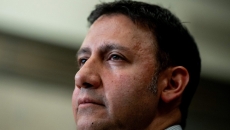The federal government says procedural changes planned by the United States to tighten rules for asylum seekers coming from Canada are in line with the Safe Third Country Agreement.
Immigration, Refugees and Citizenship Canada spokesperson Matthew Krupovich said the changes "do not impact the terms of the (agreement) nor the criteria for an exemption or exception under the agreement."
"We are in regular contact with the U.S. on a range of issues and continue to work with them on this and other areas of border co-operation," Krupovich said in an emailed statement.
The U.S. Department of Homeland Security confirmed Tuesday that it reviewed the Safe Third Country Agreement with Canada and concluded that it could streamline the process without affecting access to fair procedures for determining a claim to asylum.
Under that agreement, which came into effect in 2004, refugee claimants must seek asylum in the first of the two countries they arrive in.
The procedural change means people entering the U.S. from Canada and making an asylum claim there will now have four hours to consult with lawyers instead of 24 hours.
The change also means border officers will only consider the documentary evidence that asylum claimants have with them when they arrive. Previously people could ask for time to gather evidence.
Jamie Chai Yun Liew, a law professor at the University of Ottawa, said the Canadian government’s response is disappointing.
"This clearly says to me that they are prioritizing efficient processing at the border over humanitarian concerns and commitments to international refugee law," Liew said in an email.
She was part of a legal team that intervened when the agreement was challenged before the Supreme Court of Canada. The court ruled last year that the pact with the U.S. is constitutional.
Prime Minister Justin Trudeau and President Joe Biden updated the Safe Third Country Agreement around the same time to close a loophole that allowed people who skirted official border crossings to make a claim.
That led to a dramatic drop in people crossing into Canada from the U.S. at unofficial border crossings, but the number of people travelling in the opposite direction has started to increase.
U.S. Customs and Border Protection data shows agents arrested more than 12,000 people along the border with Canada in the first six months of 2024 — already more arrests than were made in all of 2023.
The number of migrants crossing between Canada and the United States is much smaller than at the U.S.-Mexico border. But the new rules at the Canada-U. S. border mirror time-constraint changes that were brought to America’s southern border earlier this year.
Biden made sweeping changes around the border with Mexico in June. Migration is an issue both parties are keen to target ahead of the November election.






